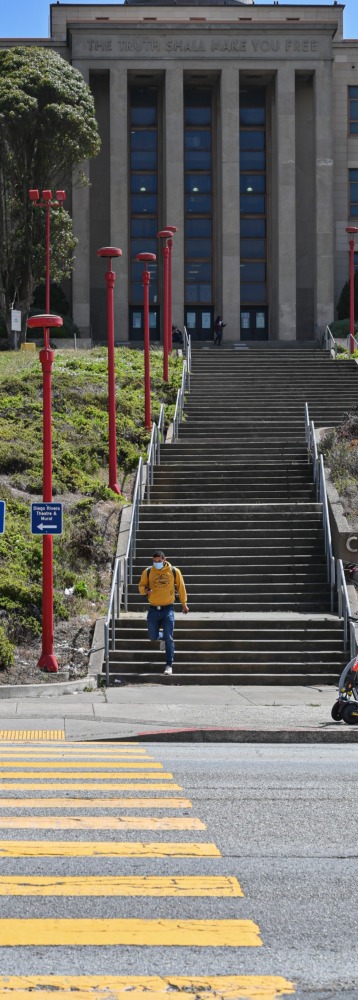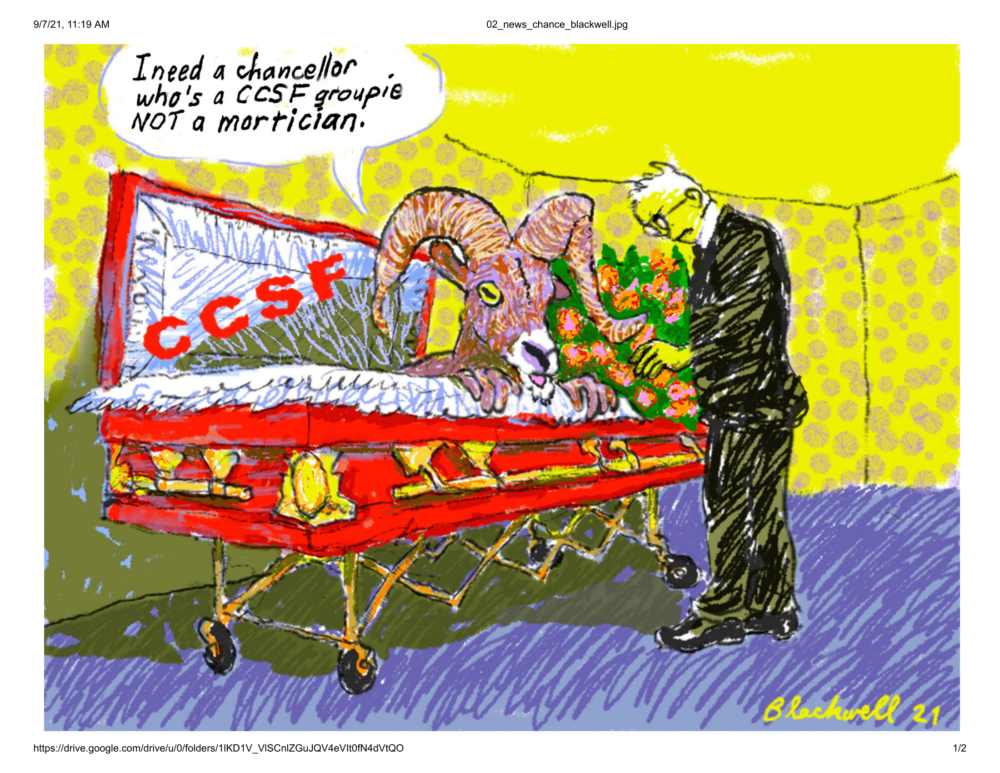The Chancellor Finalists: Candidates Largely Align in Approaches to Restore Solvency, and In-Person Classes
By Garrett Leahy
garretteleahy@gmail.com
As the semester kicks off, City College is in the final stretch of picking its next Chancellor, narrowing the search down to three finalists, one of whom will start on Oct. 1.

Photograph by Bob Kinoshita/The Guardsman.
Some of the main challenges for the chancellor will be ensuring the college’s long-term fiscal stability while making preparations to bring back in-person classes. Opinions on how these goals should be achieved differ between AFT2121, the union which represents the college’s faculty, and the Board of Trustees, with chancellor candidates in the running having largely similar stances on achieving goals mostly inline with the Board’s opinion and differing from each other only slightly.
Whoever is hired by the Board of Trustees will have to deal with a chronic budget deficit and low enrollment according to Board President Shanell Williams, and will have to take a hard look at which classes drive enrollment and which do not in order to get the college fiscally healthy.
“I think that the biggest challenge for our incoming chancellor will be to look at where we are in terms of our enrollment, and help us get on a path to grow our enrollment and that we are fiscally solvent … bringing an external perspective around what [classes] are in demand and where to we have opportunities to grow based on what students are demanding,” said Williams. “We need to look at student demand, and look at what programs will drive enrollment.”
Williams also said that the state’s Student Centered Funding Formula, which bases funding allocations on enrollment numbers, has presented “challenges” to City College, and that the Chancellor must lead the way in advocating for additional funding for the school.
“We’ve heard loud and clear that San Franciscans want us to be a full-service college, and with the current state funding formula, that’s a challenge,” said Williams, adding, “We definitely will need [local support], and I see the chancellor as the main champion to get us get the resources that we need.”
On Williams’ last point, City College’s faculty union, AFT2121, is in agreement, saying that their top priorities for Chancellor are that whoever is hired advocates at the local, state, and federal level to bring additional funding into the school.
“One of the most urgent things is funding our school. We are dramatically underfunded, we can’t do what the city and community needs us to do because we don’t have the resources,” said Finkelstein. “The new chancellor will need to bring in revenue and work with City Hall, groups around the city, and at the state and federal level to bring in resources so we can be the college that San Francisco needs to be.”
Finkelstein was clear, however, in saying that the union does not support layoffs and cuts. On the contrary, Finkelstein said that class sizes will need to be smaller if the school hopes to reopen for in-person education, in order to facilitate social distancing in classrooms.
“It’s the opposite of what the college should do. Our goal is to serve San Francisco, you don’t serve San Francisco by increasing class sizes and lowering the quality of education, and you don’t serve the students by cutting their classes,” said Finkelstein. “San Francisco needs us to step up and maintain what we have and increase it so we can be an engine of recovery for the City.”
Opening In-Person
Another key challenge for the incoming chancellor will be getting students back to school. Candidates were somewhat short on details, promising collaboration to create a plan that would work for everyone at City College which also complied with local health orders, but most did not share many specific policies or strategies that they would pursue.
David Martin, a familiar face for some at City College having previously served as Vice Chancellor of Finance and Administration, left in December 2017 to work as an administrator in the Monterey Peninsula Community College District. He has served as President and Superintendent at MPCCD since July 2019.
Martin did not respond to multiple requests for an interview, but said during his public forum that he would take input from “constituent groups,” including students, faculty, and staff, saying that creating a collaborative dynamic would be his responsibility as chancellor. He did not include details on how public input would be solicited or in what setting in would be shared.
At his Aug. 24 Candidate Forum, Martin said, “It’s my responsibility as the Chancellor to ensure that that environment, exists, that individuals fill in power to engage in meaningful conversation when it comes to reopening in California community college campus, and ensuring that whatever feedback and input is received, [and that] there is a circle of feedback back to the engaging participant to ensure that the communication loop is closed.”
Christopher Villa, the only candidate who has not worked at City College before, said in a phone interview that he supports a vaccine mandate for students, faculty, and staff, with weekly testing for those who cannot receive the vaccine. However, Villa acknowledged that a lot of the details about reopening remain hazy, particularly because roughly half of City College’s faculty are apprehensive about returning to campus, despite 86% of faculty being fully vaccinated, according to Villa.
“Is it 100% in-person, or hybrid in-person? It’s a good question … let’s make sure we get our data clear before moving forward and updating an administrative procedure that affects our students,” said Villa.

Chronic Budget Deficit
As for dealing with the budget deficit, all three candidates acknowledged its importance, although some were more concrete in their approach than others.
Martin said that he wants to include voices to create a plan for solvency long-term, pointing to past success at Monterey, where he claimed to have created a “five-year plan” that both “constituent groups” and the Board of Trustees approved of. Martin also said that he would, as chancellor, advocate at the state level for increased funding.
“Part of a chancellor’s responsibility,” Martin said, “… is to continue to advocate for resources at the statewide level as it applies to the budget development process specifically to City College because that is a critical component to building and understanding future budget scenarios and fiscal implications of decisions, but not only our legislators are making today, but the system itself is making as well.”
Kristina Whalen, who is currently Vice President of Academic Services at Las Positas College, is another familiar face to many at City College, having worked as Associate Vice Chancellor of Enrollment Management and Instructional Support from August 2018 to June 2019. Whalen declined to be interviewed for this story, but said during her public forum that her strategy for balancing the budget is to increase enrollment at City College as increasing enrollment will go hand-in-hand with streamlining course offerings to those which garner high student interest and which have the best record of leading students into high-paying jobs. Whalen, however, did not share any ideas on how to directly boost enrollment.
“The single most determining factor is the number of students that you have and that you’re serving. And that it is tied to revenue is the single most important thing … the choices made around the schedule will determine the future health of City College of San Francisco,” Whalen said. “I have said a number of times that the budget is the problem,” she added,” but the challenge is what we’re going to offer what we can afford to offer, and it has to be the smartest choices. The choices that serve our students the best and provide them with the best opportunity for social mobility.”
Villa also expressed concern over City College’s financial state, and also pointed to lower enrollment as a primary concern. Villa, too, acknowledged that class cuts may need to happen in order to keep the school in the black, but stressed that he does not want to make cuts to classes in accredited Career and Technical Education fields, which include nursing and culinary arts.
Villa said that as chancellor, he would strive to be “politically savvy,” which he said involved seeking additional funding from the federal, state, and local level, including calls to expand the Workforce Education Recovery Fund, $500k of one-time funds which were established by the Board of Supervisors in October 2020.
Villa also said during the interview that he wanted to focus on ways to increase enrollment at City College, saying that he would base his approach off of input from the Enrollment Management Committee as well as listen to input from students, staff, and faculty.
“If I’m selected as chancellor I’m going to request that all faculty and staff and students think of ways that can bolster enrollment. I’m going to foster an environment that’s like all hands on deck … I appreciate the work that faculty and staff are already doing,” Villa said.
When asked about some ideas floated by faculty, including marketing City College in more languages and resuming campaigns to mail printed course schedules to San Francisco residents, Villa said, “From my perspective there have been mixed results for [mailing out schedules] … I would look at the costs and benefits to doing that … whether the cost of that offset by the [Full-Time Equivalent Students] that was generated from mailing out hard copies of the schedules to the community,” Villa said.
No AFT2121 Endorsements
Finkelstein said that while they have carefully researched each candidate, they will not endorse or otherwise take a position on any candidate.
“All three of these have people who work with them … who like them and who don’t like them. All three seem to be nice, kind people who value accessibility and transparency, all three seem to have good working relationships with at least some of the faculty and unions we have spoken to,” said Finkelstein. “At this time we have not taken a position between the three.”
Finkelstein added that what faculty really want to see in the next chancellor is that they genuinely care about the school and what it means to the community, and therefore be willing to stick around for several years before leaving for another position, in order to gain the trust of faculty.
“There are a lot of administrators who don’t build ties to their school, part of it is that they are always looking for a better position,” Finkelstein said. “When I talk to faculty and say ‘Hey your administrator is applying to our school, can you tell me about them?’, one of the common reactions I get is ‘What they’re leaving already? They obviously have no commitment to where they’re at.’ And that is a common reaction faculty have to administrators when they move around.”
